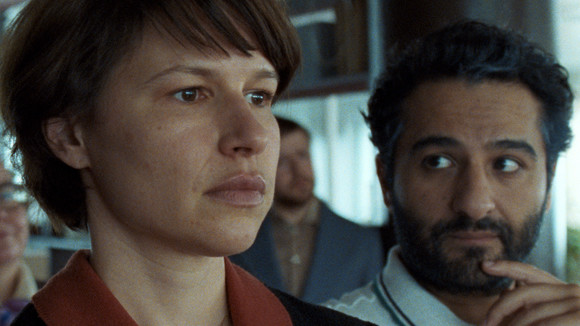You should see this: The incumbent Norwegian Prime Minister Gro Harlem Brundtland (Kathrine Thorborg Johansen) is waiting in the premises of the Masonic lodge in Trondheim with her challenger Kåre Willoch for the start of the television show in which they will discuss things one last time before election day. The recording is delayed, there are problems with the electricity. Willoch tries to have a casual chat.
Before that, one of Brundtland’s employees claims to have seen a hippopotamus outside. Brundtland dismisses this as nonsense. After going to the toilet, she hears wild snorting, raging and clattering in the distance. But a hippopotamus? Brundtland and Willoch get into a factual exchange, discussing the possibility that there is a hippopotamus in the house, arguing whether hippopotamuses can swim. Suddenly the TV discussion is over. The cameras had been switched on without them noticing.
© NDR/Motly/Novemberfilm/NRK
Brundtland and Willoch’s exchange is so absurd and ambiguous that it seems as if it had been written by Samuel Beckett and John Cleese after watching the US series “Moonlighting”. The credit goes to Johan Fasting, who, together with Kristin Grue and Silje Storstein, created the exuberantly imaginative political series with the unsuccessful German title “Powerplay – Smart Girls Go for President”, in the original simply “Makta” (Power).
The first season followed Brundtland’s journey from a little-known young politician in the Socialist Workers’ Party to the office of Minister for the Environment, against male arrogance and insidious intrigues. The second season shows her as Prime Minister. One episode takes place on the island of Utøya, which would later gain tragic notoriety through the right-wing extremist gunman Anders Behring Breivik, but here serves as an idyllic backdrop for Brundtland’s encounter with the rebellious Young Socialists.
© NDR/Motly/Novemberfilm/NRK
Brundtland’s inner-party rival Reiulf Steen also visits the holiday camp. Away from the hectic political hustle and bustle, a discussion takes place. After a moment of harmony, the mood changes: Brundtland reminds Steen that, to her regret, this meeting never took place. It is an invention of the team of authors.
This irreverent, skilful play with invention, re-enactments and real documentary material defines the exceptional quality of this series. Fasting, Grue and Storstein have created a kind of deconstructive narrative form. They break down the content and technical building blocks, mix them up and put them back together. Typical: breaking the fourth wall. At one point Brundtland breaks off a scene and complains to the team. But here it is not the actress Johansen who is complaining about her role, but still the fictional character Brundtland, who feels that he is portrayed incorrectly in the scripts.
OV-Trailer
